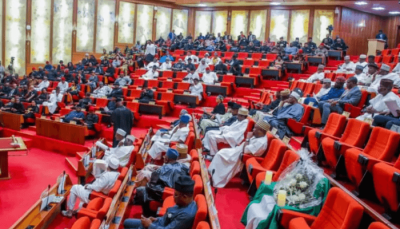Senate completes passage of tax reform bills
…Constitutes conference committee to harmonise with Reps
The Senate on Thursday passed the final two of four critical tax reform bills, signaling the near completion of President Bola Tinubu’s tax overhaul agenda.
One of the bills passed on Thursday is the Joint Revenue Board Establishment Bill.
The bill seeks to establish a centralized body responsible for coordinating and harmonizing revenue administration across different tiers of government in Nigeria.
The body intended to be established is to replace the existing Joint Tax Board, and establish a Tax Appeal Tribunal to be headed by an Executive Secretary who must come from the Civil Service.
The Senate also passed for third reading the Nigeria Tax Bill 2025, which seeks to consolidate all tax laws, modernize the tax system, improve compliance, and contribute to sustainable economic growth.
The Senate further set up a conference committee to compare with that of the House of Representatives and harmonise the bills into a document and thereafter transmit to the president for assent.
The committee is led by are: Abdulahi Yahaya. Others are: Abdulaziz Yari, Sani Musa, Enyinnaya Abaribe, Abba Moro, Francis Ezeanwa, Tokunbo Abiru, Gbenga Daniel, Joel Thomas-Onawakpo, Asuquo Ekpeyong, Tahir Monguno, Jim Kuta, Babaginda Husseini, Solomon Adeola, and Adams Oshiomole.
In a press briefing after the passage of the bills, Sani Musa, Chairman of the Senate Committee on Finance, who championed the reform process, said, “This is a turning point for Nigeria’s fiscal governance.
“We are finally aligning with global best practices to improve our tax-to-GDP ratio and ensure long-term prosperity.”
The four bills represent the most comprehensive overhaul of Nigeria’s tax architecture in decades.
At their core, the reforms aim to streamline tax administration, simplify compliance, promote equity, and improve revenue generation across all tiers of government.
The centerpiece of the new framework is the replacement of the Federal Inland Revenue Service (FIRS) with the Nigeria Revenue Service (NRS).
The restructured agency will be governed by an independent board comprising a Chairman, Executive Vice Chairman, six Executive Directors, and representatives from strategic economic ministries.
“To boost transparency and public trust, the reforms introduce a Tax Appeal Tribunal to handle disputes and create the Office of the Tax Ombudsman, an independent body tasked with protecting taxpayer rights and ensuring fairness in administration.
“Another standout feature is the launch of a Single Tax Window, a digital platform designed to unify all tax processes, reduce leakages, and enhance real-time compliance.
“The Nigeria Tax Bill, 2025 introduces sweeping fiscal changes. Notably, the Company Income Tax (CIT) rate will drop from 30% to 27.5% in 2025, with plans to reduce it further to 25%. Small businesses with annual revenues below ₦50 million will enjoy full exemptions from income and withholding taxes.
The bill also introduces a progressive Personal Income Tax regime, exempting those earning ₦800,000 or less annually while capping the highest rate at 25% for incomes above ₦50 million.
“In a move that redefines intergovernmental fiscal relations, the Value Added Tax (VAT) derivation formula has been revised. VAT will now be distributed based on place of consumption rather than origin, with the Federal Government receiving 10%, states 55%, and local governments 35%.
“The controversial Development Levy was also reviewed—cut from 60% to 50%—with 10% now earmarked for defense infrastructure, reflecting Nigeria’s pressing security needs. Other allocations include: NASENI – 10%, NITDA – 10%, NELFUND (Student Loan Fund) – 15%, Cybercrime Fund – 5%, and Defence Infrastructure – 10%.”
To prevent abuse of tax exemptions and protect local industries, companies operating in Export Processing Zones (EPZs) that bring more than 25% of their goods into the domestic market will now be taxed at the same rates as local producers.
The bills also strengthen cooperation between federal and subnational tax agencies, with the new Joint Revenue Board (JRB) replacing the old Joint Tax Board to foster improved coordination and data sharing.
Senate Majority Leader Opeyemi Bamidele defended the legislature’s role in the process, pushing back against claims that the National Assembly acted as a rubber stamp for the executive.
“We held 39 structured engagements across sectors,” Bamidele said. “Civil society, religious bodies, the oil and gas industry, and Export Processing Zones were all consulted. This was a deliberate and rigorous process.”
Senator Musa echoed this sentiment, adding that over 76 stakeholder organizations were involved in shaping the final outcome, including the Christian Association of Nigeria, the Islamic Sharia Council, the League of Imams, and the Oil Producers Trade Section (OPTS).
With the Senate’s work now complete, a conference committee will be convened between the Senate and the House of Representatives to harmonise differences in their respective versions of the bills. Once aligned, the harmonised documents will be sent to President Tinubu for assent.
“This reform is overdue. It will be remembered as one of the most consequential actions of this National Assembly,” Senator Musa said.
“We have sacrificed, and I believe Nigerians will judge us fairly.” (BusinessDay)


